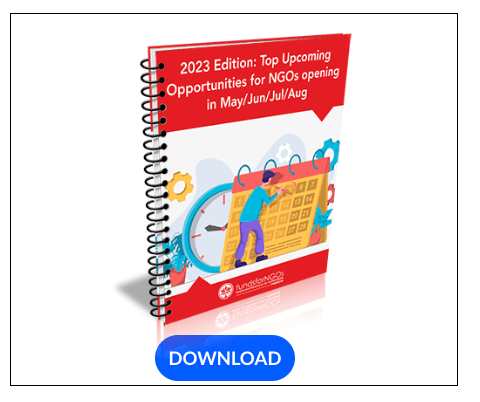
Deadline: 17-Jul-23
The International Development Research Centre (IDRC) and the Global Partnership for Education (GPE) invite proposals for applied research projects to generate and mobilize evidence in support of scaling the impact of innovative approaches that will strengthen education data systems and data use. This call focuses on GPE partner countries in Africa, Europe, Asia and the Pacific (EAP).
The Global Partnership for Education Knowledge and Innovation Exchange (KIX) is a joint endeavor of GPE and IDRC. KIX supports countries to have and use the evidence and innovation they need to accelerate access, learning outcomes and gender equality through equitable, inclusive, and resilient education systems fit for the 21st century. KIX achieves this by facilitating direct knowledge sharing across GPE partner countries through four regional Hubs and by funding applied research on their priorities. KIX is part of GPE’s strategy to support transformative change for education in lower-income countries.
Objectives
The objectives of this call are to:
- Generate evidence about how to scale the impact of innovative approaches to address challenges of data systems and data use in education systems.
- Strengthen the capacities of relevant stakeholders to use that knowledge and innovation.
- Mobilize the evidence developed to improve policy and practice in education systems.
The Challenge
- To generate and mobilize evidence to scale the impact of innovative approaches to strengthen data systems and data use for education.
- Three interrelated subthemes under this challenge require research, and each involves addressing technical issues, multiple aspects of capacity strengthening, effective governance, and sustainability:
- Subtheme 1: Expanding and integrating data sets to understand learners and promote gender equality, equity and inclusion
- Subtheme 2: Using platforms and tools to enhance data use
- Subtheme 3: Expanding uses and users of data, including for public accountability
Grant Types, Funding Scope and Duration
- KIX will allocate up to CA$ 14 million through this call.
- Single-country grants
- Focus: targeting impact in a single country; tailored to specific national needs, in direct association with national policymaking institutions
- Funding (CA$): 300,000-500,000
- Duration (months): Up to 24
- Multi-country grants
- Focus: targeting impact in three or more countries with direct relevance to specific priorities in those countries
- Funding (CA$): 800,000-1,500,000
- Duration (months): Up to 36
- Regional/ global grants
- Focus: targeting impact more generally at a regional or global level, with grounded work in at least three countries; generating public goods such as toolkits or platforms
- Funding (CA$): Up to 2,500,000
- Duration (months): Up to 36
- Multi-country and regional/global grants are preferred. Single-country grants will be considered where multi-country work is difficult and/or when the proposal provides a compelling and unique opportunity for learning from a single-country case.
- Proposals must target, and be grounded in, GPE partner countries in Africa, Europe, Asia and the Pacific.
- IDRC reserves the right to fund additional proposals from this call if/when more funding becomes available.
Expectations of Projects
- Linkages Linkages to education policy priorities and key stakeholder endorsement
- Proposals must demonstrate clear links with education policy priorities and define plans for effective engagement of key stakeholders such as the ministry of education. This could be through a letter indicating approval or interest from an appropriate authority in the ministry, or evidence of clear alignment with current official documents such as the partnership compact, the education sector plan, or other similar strategic plan documents. Proposals should demonstrate that the organization applying for the grant is working in and has relationships with relevant education stakeholders in the target countries.
- High-quality research for development
- Funded projects will be expected to undertake research for development, which is designed to build knowledge, innovation, and evidence, strengthen capacity, and mobilize knowledge for policy and practice. They should be problem-focused and action-oriented. They should creatively identify and engage with relevant users of the knowledge and innovation. They should involve education system stakeholders throughout to ensure that research is relevant and positioned for use in policy and practice.
- Research for scaling innovation, using a critical approach
- Proposals are expected to focus on promising or proven innovative approaches that have potential to be scaled and facilitate transformative change in GPE partner countries. Innovations may include, but are not limited to, tools, practices, policies, programs, technologies, frameworks, methodologies, or any other interventions that can be used to address the challenge, sometimes in combination. The innovative approaches may come from within or outside GPE partner countries.
- KIX will not support the large-scale implementation of identified innovations; it will, however, fund research for development to generate evidence for their scaling. This may include:
- adapting and refining the innovations to the contextual needs of the selected countries;
- developing and testing means and models to scale them;
- supporting capacity strengthening of stakeholders who will adapt, adopt and scale the innovations;
- conducting a cost analysis of the innovations; and
- assessing results.
- Gender equality, equity, and inclusion (GEI)
- Proposals should demonstrate how GEI will be promoted, using an intersectional approach, with respect to both:
- team composition and organizations comprising the research team; and
- the design and implementation of the proposed research.
- Gender-blind proposals will not be considered.
- Proposals should demonstrate how GEI will be promoted, using an intersectional approach, with respect to both:
- Being part of the Knowledge and Innovation Exchange (KIX)
- The projects funded out of this call will become part of KIX. They will be invited to participate in joint learning and synthesis activities with other projects, and to extend their knowledge mobilization strategies with regional Hubs. They will be invited to participate in the KIX-wide project called Research on Scaling the Impact of Innovations in Education (ROSIE).
Eligibility Criteria
- General eligibility criteria for all grant types
- Proposals must be submitted by nationally/internationally registered or incorporated organizations. These could include, inter alia, research institutions, universities, think tanks, network secretariats, associations, civil society organizations, non-profits, or the private sector.
- Applicants must have independent legal status (or “legal personality”), be capable of contracting in their own right and name, receiving and administering funds, and have the authority to direct proposed project activities. Applicants must be able to demonstrate their legal status through written documentation. Legal status will only be reviewed if and when applicants are selected following technical selection.
- Proposals may be submitted by individual organizations, or by consortia of up to three organizations. Proposals from consortia must name one lead organization, which can subgrant to the others. Proposals from, or that include, private sector partners should demonstrate how private sector resources – financial or technical knowhow – will contribute to the project. Organizations/consortia must have a strong presence and track record of work in the education sector of GPE partner countries.
- Specific eligibility criteria for the three types of grants
- KIX will prioritize funding to organizations based in low- and middle-income countries (LMIC) in regions covered by this call.
- Single-country grant proposals must be submitted by national organizations based in the country of focus. They may apply as individual organizations or lead a consortium that includes other organizations whether from within or outside the country.
- Multi-country grant proposals must be submitted by an organization based in a low- or middle-income country in Africa or the EAP region. Other consortium members may include organizations from within or outside the region; national, regional, or international offices of multi-lateral organizations; or international NGOs.
- Regional/global grant proposals may be submitted by any organization that meets the general eligibility criteria, as an individual organization or leading a consortium.
Ineligible
- Individuals.
- Government ministries and agencies are not eligible for funding but can be involved in projects.
- For-profit providers of core education services.
For more information, visit IDRC.
